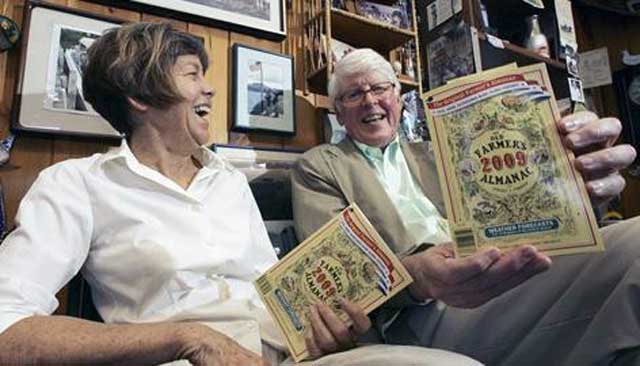
Editor Janice Stillman, left, watches as Editor-in-Chief Jud Hale displays the 2009 edition of the Old Farmer's Almanac in Dublin, N.H., Thursday, Sept. 4.
By Jim Cole, AP
Old Farmers Almanac: Global cooling may be underway
September 9, 2008
By David Tirrell-Wysocki, Associated Press Writer
DUBLIN, N.H. — The Old Farmer's Almanac is going further out on a limb than usual this year, not only forecasting a cooler winter, but looking ahead decades to suggest we are in for global cooling, not warming.
Based on the same time-honored, complex calculations it uses to predict weather, the Almanac hits the newsstands on Tuesday saying a study of solar activity and corresponding records on ocean temperatures and climate point to a cooler, not warmer, climate, for perhaps the next half century."We at the Almanac are among those who believe that sunspot cycles and their effects on oceans correlate with climate changes," writes meteorologist and climatologist Joseph D'Aleo. "Studying these and other factor suggests that cold, not warm, climate may be our future."
It remains to be seen, said Editor-in-Chief Jud Hale, whether the human impact on global temperatures will cancel out or override any cooling trend.
"We say that if human beings were not contributing to global warming, it would become real cold in the next 50 years," Hale said.
For the near future, the Almanac predicts most of the country will be colder than normal in the coming winter, with heavy snow from the Ozarks into southern New England. Snow also is forecast for northern Texas, with a warmer than usual winter in the northern Plains.
Almanac believers will prepare for a hot summer in much of the nation's midsection, continuing drought conditions there and wild fire conditions in parts of California, with a cooler-than-normal season elsewhere. They'll also keep the car packed for the 2009 hurricane season, as the Alamanac predicts an active one, especially in Florida.
But Editor Janice Stillman said it's the winter foreasts that attract the most attention, especially this year, with much higher heating prices.
So, in line with the weather and economy forecasts, the Almanac includes information on using wood for heat: the best wood, how to build a fire in a fireplace, whether to use a wood stove and how to stay warm — all winter — with a single log.
Here's the secret, popularized in 1777: Throw a log out an upstairs window, dash down the stairs and outside, retrieve the log, dash upstairs, throw the log out the window and so on.
"Do that until you work up a sweat and you'll be warm all winter," said Stillman.
Last year, the Almanac correctly predicted "above-normal" snowfall in the Northeast — an understatement — and below-normal snowfall in the mid-Atlantic states.
New Hampshire, home of the Almanac, saw the most snow in 134 years and missed an all-time record by 2.6 inches.
Established in 1792, the Old Farmer's Almanac is North America's oldest continuously published periodical. The little yellow magazine still comes with the hole in the corner so it can hang in outhouses.
Boasting 18.5 million readers, this year's edition contains traditional tips on gardening and astronomical information and tide charts so accurate the government considered banning them during World War II, fearing they would help German spies.
The Old Farmer's Almanac is not to be confused with the Maine-based Farmer's Almanac, published "only" since 1818.
The 217th edition also predicts social trends such as sofas that measure body temperature, shopping carts that sound an alarm when filled with too much junk food and closet shelves and hangers that talk to give advice on matching shirts and ties.
"I would really hate that," Hale said. "What do you mean these don't match? Of course they match! You kidding me? Pink goes perfectly well with yellow," he joked.
Upholding its tradition of being "new, useful and entertaining," the Almanac offers tips on how to keep gardens alive, even in snow, and how to keep people alive, even for 100 years. (Some examples: Take it easy, use your brain, laugh and flirt!)
As printed publications fold around the country because of falling readership, Stillman says the Almanac is keeping pace with the 21st Century with a website that offers the printed version and supplements that can be personalized based on a reader's ZIP code.
Hale said the magazine with the familiar features remains popular in a digital age because, well, it's an almanac, and readers have said they like it being predictable.
"'Oh good,' they say, 'Not everything is disappearing."'
This year, after 154 pages of words of wisdom from scientists and other experts, the 2009 edition closes with words from children — letters to God from first- and second-graders.
One, signed Joyce, shows little kids know not to be ungrateful, even when faced with a big disappointment.
"Dear God," she wrote. "Thank you for the baby brother, but what I prayed for was a puppy."
Copyright 2008 The Associated Press. All rights reserved. This material may not be published, broadcast, rewritten or redistributed.